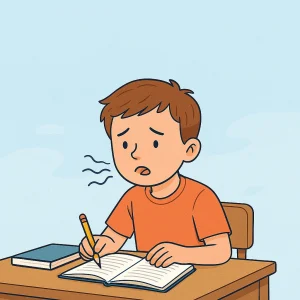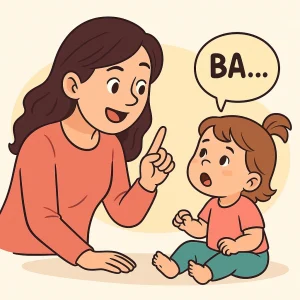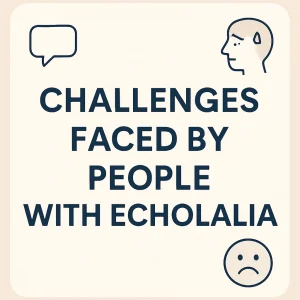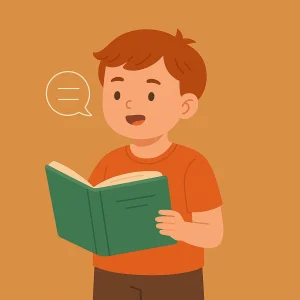My Baby isn’t Pointing or Imitating – When Should I Worry?
By Rajini D
Last Updated: April 28, 2025
It’s natural to feel a wave of worry when you notice your little one isn’t pointing, waving, or imitating the way you expected. You might find yourself wondering, “Is it just a phase, or should I be concerned?” If you’re asking these questions, you’re not alone — many parents notice small differences in their child’s communication and wonder what it means.
The truth is, every child develops at their own pace. Some toddlers jump into speaking and gestures early, while others take a little longer to find their rhythm. Still, it’s important to understand the typical milestones and recognize when a closer look might help.
Get expert support with personalized online speech therapy — designed to fit your child’s unique needs, from the comfort of your home. Book a Free Consultation Today!
What Should My Baby Be Doing at 12–24 Months?
Between the ages of 12 and 24 months, toddlers typically start hitting some exciting communication milestones. These early skills lay the foundation for speech, social interaction, and learning. Of course, every child moves at their own pace — but here’s a general idea of what you might expect during this stage:
Responding to Their Name
By around 12 months, most babies turn their head, smile, or look toward you when you call their name. It shows they recognize you’re talking to them.
Pointing to Show Interest
Pointing is one of the first ways toddlers share their thoughts without words. They might point to a favorite toy, a dog outside, or something they want you to notice.
Waving, Clapping, and Other Simple Gestures
Gestures like waving “bye-bye,” clapping hands, or blowing kisses usually start to appear. These little actions are important signs that your child is connecting and communicating.
Using Simple Words
By 18 months, many toddlers can say a few simple words like “mama,” “dada,” “ball,” or “bye.” They may not be perfectly clear yet — that’s completely okay!
Following Basic Instructions
Simple directions like “come here,” “give me the ball,” or “sit down” can often be understood and followed by toddlers in this age range.
Imitating Sounds and Actions
Your child might try copying the sounds you make, clap when you clap, or mimic funny faces. Imitation is a huge building block for learning speech and social skills.
Read More: My 3-Year-Old Only Uses Gestures – Is It a Speech Delay?
Signs It Might Be Time to Take a Closer Look
It’s important to remember that every child develops at their own pace — but certain early signs can help parents know when it might be a good idea to seek a little extra support. Early action doesn’t mean something is “wrong” — it simply means giving your child the best chance to thrive.
Here are a few signs that may deserve a closer look:
- No Pointing or Waving by 12 Months
By their first birthday, most babies are starting to use gestures like pointing to ask for things or waving “bye-bye.” If these signs aren’t showing up, it could be worth mentioning to your pediatrician. - No Words by 16 Months
While some toddlers are quiet by nature, saying even a few words (“mama,” “dada,” “no”) by 16 months is a typical part of communication development. - Limited Eye Contact
Babies naturally seek connection through eye contact. If your child rarely looks at you when interacting, it could signal a delay in social communication skills. - No Imitation of Sounds or Actions
Imitating sounds, facial expressions, or simple movements (like clapping) is a major way babies learn. A lack of imitation may suggest challenges in developing speech or social engagement. - Lack of Social Interest
Most toddlers enjoy shared activities like peek-a-boo, clapping games, or simply being around others. If your child seems uninterested in people, it might be helpful to explore further.
| Typical Development | Possible Red Flag |
|---|---|
| Points to objects to show interest | Does not point by 12 months |
| Uses a few simple words by 16 months | No spoken words by 16 months |
| Makes regular eye contact with parents and caregivers | Avoids or rarely makes eye contact |
| Imitates sounds, actions, or gestures | Little or no imitation observed |
| Enjoys simple social games and interaction | Shows little interest in people or activities |
Simple Ways to Encourage Speech and Imitation Every Day
If you’re feeling unsure about how to help your little one at home, you’re not alone — and the good news is, small, simple activities can make a big impact.
You don’t need special toys or fancy tools.
Everyday moments are full of chances to build your child’s communication skills!
Here are some easy, playful ways to get started:
Narrate Your Daily Activities
Talk through what you’re doing as you go about the day.
For example:
- “We’re putting on your shoes — one shoe, two shoes!”
- “Let’s wash hands. Splash splash!”
Hearing language paired with actions helps babies connect words to meaning.
Read Interactive Books Together
Choose picture books with big, colorful images and simple words.
Point to the pictures and name them out loud.
You can ask simple questions too:
- “Where’s the dog?”
- “Can you find the ball?”
Interactive reading makes learning fun and keeps your child engaged.
Use Gestures Alongside Words
Every time you say a word, add a gesture when you can.
Wave when you say “bye-bye,” or clap when you say “good job!”
This helps babies understand and eventually imitate both actions and words.
Play Imitation Games
Children learn by copying — so play games that invite imitation!
Ideas include:
- Clapping hands
- Blowing kisses
- Making animal sounds (“moo,” “woof!”)
- Playing simple “copy me” movements like tapping the table
Sing Songs with Actions
Songs with built-in actions are a powerful tool for speech and movement development.
Try classics like:
- “If You’re Happy and You Know It” (clap hands, stomp feet)
- “Wheels on the Bus” (make the motions for “wipers” and “doors”)
Repetition, rhythm, and fun movements help children join in more easily.
| Activity | How It Helps |
|---|---|
| Narrating daily routines | Builds vocabulary and language understanding |
| Reading interactive books | Strengthens listening and attention skills |
| Using gestures with words | Connects actions to language |
| Playing imitation games | Develops copying and communication skills |
| Singing action songs | Encourages speech rhythm, memory, and movement |
Learn More: Why isn’t My 1-Year-Old Talking Yet? What Can I Do to Help?
How Expert Guidance Can Make a Big Difference
Sometimes, even with the best efforts at home, it helps to have a little extra support. Professional guidance can uncover small things parents might not notice — and offer strategies that are just right for your child’s needs.
1. Online Speech Therapy by Licensed Professionals
Your child can work with experienced, caring speech therapists — all from the comfort and security of your own home. No travel, no waiting rooms — just focused, effective support.
2. Personalized 1-on-1 Sessions
Every child is unique. That’s why our therapists tailor each session to fit your child’s strengths, challenges, and learning style. It’s never one-size-fits-all — it’s all about your child’s journey.
3. Developmental Screenings Guided by Experts
Not sure where your child stands? We offer easy, therapist-led screening tools to help you understand your child’s communication, social skills, and overall development — without the stress.
4. Care Designed for Indian Families Around the World
We proudly support Indian parents and children across the globe. Our therapists are culturally sensitive, multilingual, and experienced in working with diverse family traditions and needs.
5. Your Child’s Journey is Unique — and Support Is Powerful
It’s important to remember: no two children grow and learn in exactly the same way. Some toddlers are early talkers and eager imitators. Others take a little more time to find their voice — and that’s perfectly okay.
Read More: 10 Things Your 2-Year-Old Should Be Able to Do
Development isn’t a race.
It’s a journey, and every child has their own path.
What matters most is staying connected to your child, noticing the small changes, and trusting your instincts when something feels different. You know your child better than anyone. If you ever have questions or concerns, seeking guidance early can make a world of difference.
Early support isn’t about rushing — it’s about opening doors to new skills, confidence, and connection.
| Myth | Truth |
|---|---|
| “Waiting will fix everything.” | Early support often leads to faster and stronger communication growth. |
| “All kids are the same.” | Every child has a unique learning style and pace. |
| “Getting help means something is wrong.” | Asking for help shows strength, love, and smart parenting. |
Conclusion
Many parents wonder if their child’s speech and communication skills are on track, and it’s completely normal to feel unsure. At Wellness Hub, we believe every child has amazing potential, and early support can make a big difference. You don’t have to wait or guess. Our caring team is ready to guide you with expert advice, simple screenings, and personalized one-on-one therapy. Remember, you know your child best, and taking early steps can open new doors for their growth. We believe in your child’s potential — and we’re here to help you nurture it.
Frequently Asked Questions:
1. Is it normal if my 1-year-old doesn’t point to things?
It’s common for babies to start pointing by around 12 months. If your child isn’t pointing yet, it could mean they need a little extra help with communication skills. Early support can really make a difference.
2. What are early signs of a speech delay in toddlers?
Early signs include not pointing or waving by 12 months, not using simple words by 16 months, poor eye contact, and not copying sounds or actions. If you notice these, it’s a good idea to talk to a speech therapist.
3. Should I be worried if my baby doesn’t imitate sounds?
Babies usually start copying sounds, faces, and actions in the first year. If your baby is not imitating by 12–15 months, it’s best to check with a professional to see if early speech therapy can help.
4. How can I help my toddler learn to point and imitate?
You can encourage these skills by using gestures often, playing simple imitation games, reading books together, and singing songs with actions. Small daily activities build strong communication skills over time.
5. When should I see a speech therapist for my toddler?
If your child isn’t using gestures, saying words, making eye contact, or trying to imitate by 15–18 months, it’s a good idea to book a speech therapy consultation. Early help leads to better results.
6. What happens during an early speech therapy session?
A speech therapist will play and interact with your child in a fun, relaxed way. They’ll show you easy activities to support speech and imitation at home, and create a plan just for your child’s needs.
7. Is online speech therapy effective for toddlers?
Yes! Online speech therapy works very well, especially for young children. At Wellness Hub, our therapists guide parents through simple activities at home that boost speech and communication skills.
8. How do I know if my child needs early intervention for speech?
Look for signs like not pointing, not using words, not making eye contact, or not showing interest in people. If you are concerned, trust your instincts — early screening can give clear answers.
9. What is a developmental milestone checklist?
A developmental milestone checklist helps you track important skills like speaking, pointing, waving, and social play. It shows if your child is on track or might need extra support. You can get a free checklist from Wellness Hub.
10. Can speech delays go away without therapy?
Some late talkers do catch up on their own. But if your child is missing key communication milestones, speech therapy can help them build strong skills early, making learning easier later.
About the Author:
Rajini Darugupally
M.Sc., Speech-Language Pathologist (9+ years of experience)
Rajini is a passionate and dedicated Speech-Language Pathologist with over 9+ years of experience, specializing in both developmental speech and language disorders in children and rehabilitation in adults. Driven by a desire to empower each individual to find their voice, Rajini brings a wealth of experience and a warm, genuine approach to therapy. Currently, at Wellness Hub, she thrives in a team environment that values innovation, compassion, and achieving results for their clients.
Book your Free Consultation Today
Parent/Caregiver Info:
Client’s Details:
* Error Message







